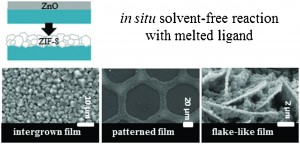Posted on behalf of Gwenda Kyd, web writer for CrystEngComm
Metal-organic frameworks (MOFs) are porous networks with a wide range of potential applications including gas storage and sensing. For their potential to be fully realised in integrated systems, efficient methods of producing thin films and patterns are crucial. Although methods exist for MOFs, these are are less developed than for other materials such as ZnO.
A new paper shows how thin films or patterns of the MOF ZIF-8 can be produced by melting the required ligand, 2-methylimidazole , in contact with a ZnO film or pattern. If the process is carried out under vacuum with an excess of ligand, it is totally solvent- and waste-free. Using this method with ZnO supported films and patterns is demonstrated to replicate the morphologies in the resulting ZIF-8, as shown in the diagram below. ZIF-8 is highly stable and has many possible uses including molecular separation and as an insulator in microelectronics. The reported strategy could allow new applications for ZIF-8 films to be developed.
For more information see the paper at:
Solvent-free synthesis of supported ZIF-8 films and patterns through transformation of deposited zinc oxide precursors
Ivo Stassen, Nicolò Campagnol, Jan Fransaer, Philippe Vereecken, Dirk De Vos and Rob Ameloot
CrystEngComm, 2013, Advance Article
DOI: 10.1039/C3CE41025K, Communication
 Gwenda KydGwenda Kyd has a PhD in metallocarborane chemistry from the University of Edinburgh. Other research work includes the spectroscopic study of the structure of glasses and organometallic electron-transfer reactions and the preparation of new inorganic phosphors. Currently she works as a scientific database editor.
Gwenda KydGwenda Kyd has a PhD in metallocarborane chemistry from the University of Edinburgh. Other research work includes the spectroscopic study of the structure of glasses and organometallic electron-transfer reactions and the preparation of new inorganic phosphors. Currently she works as a scientific database editor.











